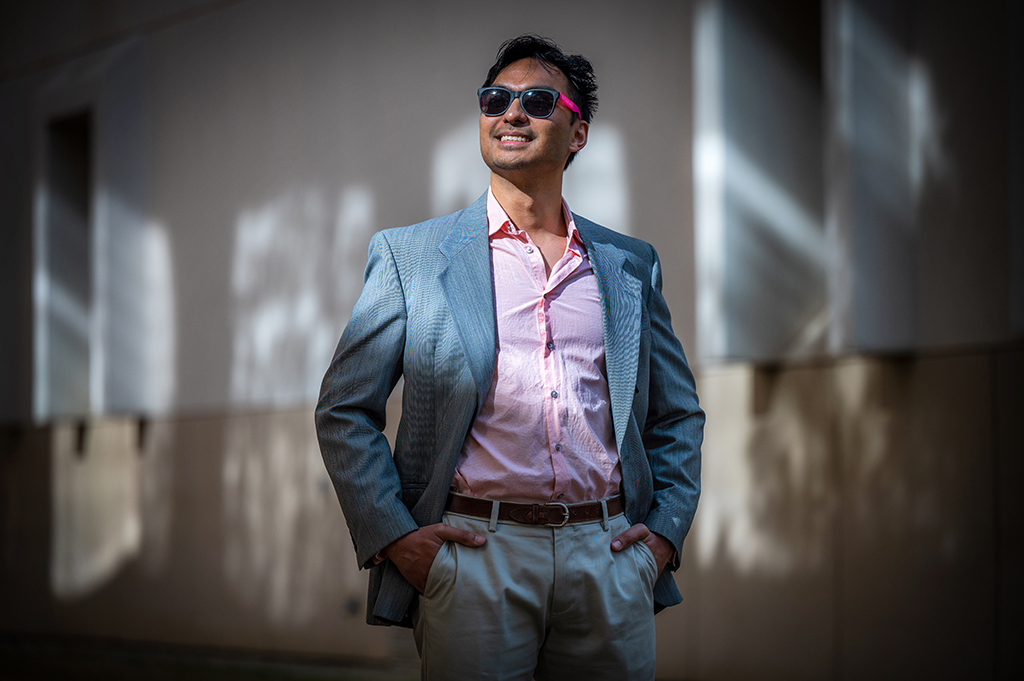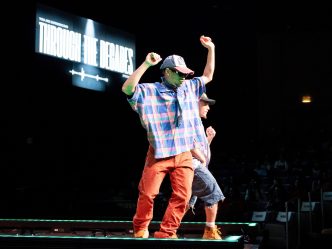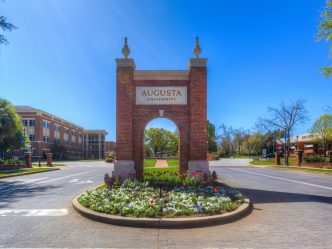If you ask Brian Nafarrete, working in health care was bound to happen… eventually.
After moving to the area from California in 2001, Nafarrete graduated from Greenbrier High School and then went to Georgetown University in Washington, D.C. He said the adjustment to college life was challenging, using a preparation for an exam as a prime example of just how different things were.
“The tests weren’t the same … It wasn’t multiple choice anymore like it was in high school. I remember my first exam for a political science class, I was quizzing a friend of mine just before the exam about historical dates and this guy interrupted me and said, ‘The test isn’t going to be like that,’” said Nafarrete, who will graduate Dec. 10 from Augusta University’s College of Nursing with a Master of Science in Nursing with a concentration in clinical nurse leader. “It was more essay-based and you had to take the information you knew and weave it all together.”
He graduated from Georgetown with a Bachelor of Arts in History, but he still wasn’t sure what he wanted to do. One idea had been on his mind for a while, however, because at the beginning of his time in D.C., he had an encounter with God that he said was life-altering.
“I went to Georgetown thinking about politics and left thinking about something else,” Nafarrete said. “A couple of years after graduating, I was grappling with the thought of going into seminary. Finally, I decided I’d go for it.”
His bishop sent him to Catholic seminary at Mount St. Mary’s University in Emmitsburg, Maryland, while he was working simultaneously on a graduate degree in theology, but he only lasted one year.
He said for every 10 people who enter the six-year program, only three become priests. After some spiritual advisement, he went to Madonna House, a Catholic community of quasi-monks and nuns in Canada. Nafarrete took his stay as a sign after being told of this same monastery a few years prior.
“There was one morning I was making butter by hand, it’s below freezing and there is a pair of horses with the snowy Canadian forests and mountains in the background … And it’s beautiful and I just started laughing, because five years earlier I wanted to go to medical school and here I am making butter in the middle of nowhere,” Nafarrete said. “I laughed, but in a good way. I just kind of marveled at God’s plans. Madonna House was very formative for my life in terms of maturity.”
He shares the story to explain how right it feels now to be pursuing a career in health care.
“A couple of months ago during practicum, there was a hospital code on a floor and I went to observe and I had this feeling come over me of just like … the privilege of being in the health care field,” Nafarrete said. “Watching the doctors and the nurses, I just had this feeling of this is where I’m supposed to be.”
After he moved out of the monastery, Nafarrete attended Augusta Tech for three semesters of prerequisites before starting at AU in fall 2020.
He credits several people for getting him back on track to work in health care, including the consecrated laypeople at the monastery who were nurses, along with his mother, Cynthia, who is a pediatrician, and his sister, Teresa, who graduated from the Medical College of Georgia in 2010.
His time at AU has been “difficult and intense but rewarding.” He was able to adjust to the workload after the first semester and was reminded of some advice a Filipina nun told him back in Canada: persevere. That stuck with him, and that’s the word he shared with the first-year CNL students on their first clinical day.
“I could have thought of something witty, but that’s what came to my heart and mind,” Nafarrete said.
He credits Dr. Jennifer Detchemendy, DNP, RN, CCNS, an assistant professor and clinical director of the Clinical Nurse Leader Program, for her guidance as his clinical instructor this past summer on AU Medical Center’s 6 North (cardiovascular intermediate care unit) and during several labs she taught. Nafarrete said he appreciated and respected the fact she “takes her craft seriously while also holding our feet to the fire to make us better students and nurses.” He also saved a note from an evaluation that had words of encouragement that has inspired him to push forward.
Detchemendy said she had Nafarrete in clinical rotations as well as in didactic courses, saying he was a good student who spent a great deal of time learning the material and asking a lot of questions.
“Brian likes to challenge the status quo, which will serve him well as an advocate for his patients,” said Detchemendy, who also mentioned that as faculty, they have a genuine desire to help grow and mentor new nurses and welcome them into the field.
“It is our responsibility to make sure they are well-prepared and with that comes a great deal of grueling coursework. Students are often shocked at the difference in rigor of this program versus their undergraduate programs and they begin to doubt their abilities to succeed as a future nurse and provide safe patient care,” she said.
“That is where our greatest strengths lie as faculty … to encourage and inspire students to dig deeper and tap into what they already have inside them. So it is wonderful validation to know that a small message of encouragement made a difference for Brian. That is what makes this all worth it for me.”
Nafarrete said the word joy comes to mind when he talks about getting through this part of his college career (graduating). He said it’s been a joy getting to know his classmates who comes from different walks of life, such as Opey Osuntuyi, who is a public health administrator in New York City; Wuil Nam, a pharmaceutical representative from South Korea who is going to school while raising three children; Stella Naza, a health care worker in Atlanta who has college-aged children; and Kenya Sayles, a mental health counselor from Atlanta.
“I marveled at people like them … the bond we’ve been able to establish has been great,” Nafarrete said.
Detchemendy’s advice for him going forward is simple: Commit to being a lifelong learner.
“Nursing is not a static profession and in order to make the biggest difference, we have to commit to constantly learning, adapting and growing as fast as health care does,” she said. “Get comfortable with being uncomfortable … because changes happen so fast in health care, there will always be something you are not familiar with. However, if you approach those unfamiliar experiences with an inquisitive spirit and your best effort, you will never feel as if you gave poor care.
“Listen to your patients and their families … yes, you are the nurse, but they know themselves and their loved ones the best and the information they can provide for you can save a life by preventing you from missing subtle changes,” she added. “Finally, always put the oxygen mask on yourself before you try to help others. Nursing is one of the most rewarding yet most difficult careers you can choose, so always take time to take care of yourself so that you give your best to your patients.”
Nafarrete is hoping to work on 5 South BMT (bone marrow transplant) in AU Medical Center. Wherever he ends up, though, he’s looking forward to making a difference to someone, no matter where they are in their stage of life.
“Who knows what I’ll do in five years … I thought about palliative care and even hospice. Every field is a continuation of that service that I once thought about fulfilling through the priesthood. In hospice, especially, it would be a privilege to accompany people who are coming toward the end of their life, to walk with them in that intimate and sacred last moment,” Nafarrete said.
 Augusta University
Augusta University




